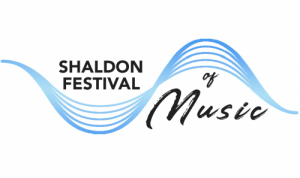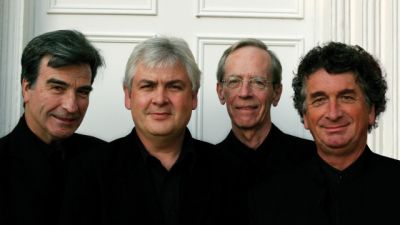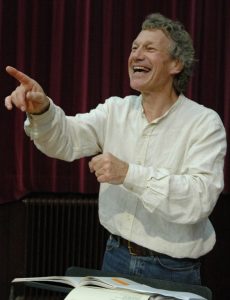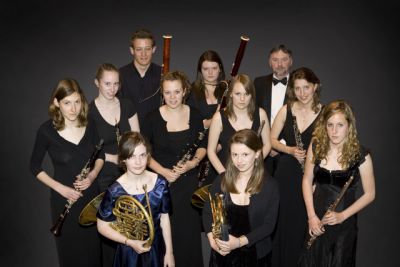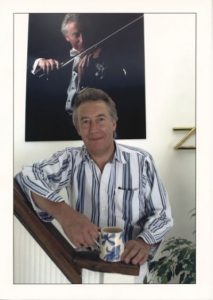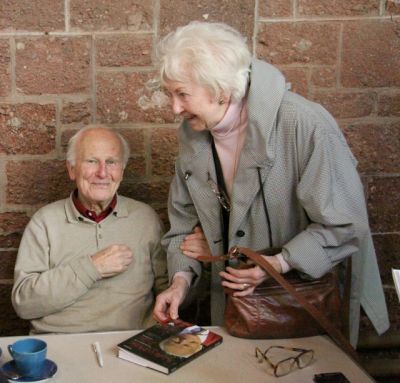Shaldon Festival 2009
Click on the past performances to jump to the information or scroll down the page.
Academy of St Martin in the Fields Chamber Ensemble
Choral Workshop and Informal Concert 2009 directed by Nigel Perrin
Richard Studt and The Sinfonietta
20th Anniversary Celebration 2009
Academy of St Martin in the Fields Chamber Ensemble
Concert
Sunday 21 June 2009
ACADEMY OF ST MARTIN IN THE FIELDS CHAMBER ENSEMBLE
Concert supported by the Exeter & District Classical Music Trust
Kenneth Sillito violin
Martin Burgess violin
Robert Smissen viola
Stephen Orton cello
Hamish Milne piano
Beethoven Piano Quartet Op 16 in Eb
Dvorak Terzetto
Brahms Piano Quintet
One word describes the final concert of the 2009 Shaldon Festival given by The Academy of St Martin in the Fields Chamber Ensemble: perfection.
Although not taking part in the concert itself, Sir Neville Marriner had graciously accepted the Festival Committee’s invitation to introduce the players. He congratulated the Festival on reaching its 20th year and paid a warm tribute to Eileen Croxford Parkhouse, a contemporary of his at the Royal College of Music and lifelong friend.
The concert opened with Beethoven Piano Quartet in E Flat Major, Op. 16 and it soon became apparent that this was to be a very special evening. Showing immaculate concentration and understanding, the string and piano playing was superb throughout from the rich Grave introduction that so seamlessly leads into the purposeful Allegro, on to the slow movement (one of Beethoven’s graceful songs), to the merry and uncomplicated rounding off of the finale. Martin Burgess then joined Kenneth Sillito and Robert Smissen for an engaging performance of Dvorak Terzetto for Two Violins and Viola. Standing up to play this four movement work it became a delightful musical conversation between the players and was thoroughly entertaining.
The final work in the concert was Brahms Piano Quintet in F minor, Op. 34. It was stunningly well played with tremendous vigour and power but never losing clarity. The technical command was amazing with the tempo transitions in the outer movements, the second movement lovingly played with a tender passion and the Scherzo exciting and intense. Following rapturous applause at the end, the audience was treated to a little gem of an encore. Entitled Stãndchen and composed by Richard Strauss when he was a teenager, Hamish Milne explained the piece was only discovered and published in the 1980’s. It seems there was a wealthy Uncle Georg Pschorr, a master brewer, who supported him as a boy and Strauss wrote a few pieces as a thank you.
The widely agreed verdict on this season’s series of concerts is that it was a vintage year. Over 1,000 people attended the Festival over the four days in June, enjoying live classical music of the very highest standard. For a small, coastal village in Devon, Shaldon can be justly proud of this community event; plans are well in hand for the 21st season 17-20 June 2010.
Enid Hayles
Choral Workshop and Informal Concert 2009 directed by Nigel Perrin
Choral Workshop
Saturday 20 June 2009
Karl Jenkins The Armed Man – A Mass for Peace
Musical Director: Nigel Perrin
Piano: Peter Adcock
Vocal Soloist: Kim Van der Kiste
Cello: Isabelle Woolcott
Trumpet: Hannah Spooner
Piccolo: Hannah Lindsay-Clark
Percussion: Tim Woolcott
Detail:
The combination of Nigel Perrin, one of the country’s leading choral conductors, and the selected choral work of Karl Jenkins The Armed Man – A Mass for Peace, attracted a record number of 220 people registering to sing at the Saturday Choral Workshop. From innovative and fun warm up exercises through to three well planned rehearsal sessions, Nigel expertly worked on improving the quality of the choir singing and technique. The informal concert in the evening was a triumph; absorbing all they had been taught, the choir gave a moving performance of The Armed Man to a packed audience in St Peter’s Church.
The Armed Man incorporates a wide range of sacred and secular texts from around the world, all set within the framework of the Christian mass: sacred texts from the Bible and Koran and the Mahàbharata, a 6th century Hindu poem; secular texts by Malory, Dryden, Tennyson, Swift, Kipling, Togi Sankichi (a survivor of Hiroshima who later died of leukaemia caused by radiation exposure) and Guy Wilson, Master of the Royal Armouries, who also selected many of the texts set by Jenkins. The singers certainly seemed to relish the drama of the piece; from the opening marching to war, to a powerful rendition of the Hymn Before Action which was followed by an exciting battlefield Charge!
The soprano soloist engaged for the day was unfortunately disposed and Kim Van der Kiste sang all the solo passages, soprano, contralto and baritone, with great warmth and compassion. Her singing of Now The Guns Have Stopped was a particularly poignant moment. The choir was well supported by the small ensemble of musicians led by Peter Adcock on the piano. Peter accompanied the first big festival workshop back in 1997 and has become an indispensable part of the Shaldon Festival Choral Workshop Day ever since.
A fun and educational day of music making which will, no doubt, be remembered by the 200 plus singers for many years to come.
Enid Hayles
Wells Cathedral School
Concert
Friday 19 June 2009
Young musicians from WELLS CATHEDRAL SCHOOL
with Edward Scull on Marimba
Programme:
13 winds
Suite in B-flat major, op. 4. RICHARD STRAUSS
Praeludium
Gavotte
Edward Scull – Marimba
Land TAKATSUGU MURAMATSU
The Green Road MARK FORD
Joseph Shiner and Jessamy Holder – Clarinet duet with piano
Homage a Manuel de Falla CHARLES CAMILLERI
Allegro moderato – Andante molto – Allegro vivace
Rebecca Carson and Rosie Bowker – Flute duet with piano
Andante and Rondo FRANZ DOPPLE
Edward Scull – Marimba
Trois Pieces Breves JACQUES IBERT
Allegro – Andante – Allegro scherzando
Polaris MARK FORD
13 winds
Serenade in B-flat K361 WOLFGANG AMADEUS MOZART
Largo/molto allegro
Menuetto
Adagio
Romance
Finale molto allegro
As is traditional with the Festival, the accent was on youth for the Friday evening concert showcasing the Wells Cathedral School Wind Ensemble. In the words of their Head of Woodwind, Kevin Murphy, who introduced the concert items, “forget about TV reality shows such as ‘Britain’s Got Talent’, real talent lies with these gifted young musicians.” In a well constructed programme, the full ensemble of 13 winds opened the concert with two movements from Richard Strauss Suite in Bbmajor, composed when Strauss was only 17. Not an easy piece to play with many exposed lines, the woodwind and horn players together with the single double bass player acquitted themselves well. The concert also finished with 13 winds, this time with five movements from the more familiar Mozart Serenade in Bb ‘Gran Partita’, and played with great assurance and conviction.
Sandwiched between these works there were a number of solo and small group items. Joseph Shiner, who was a woodwind finalist in the 2008 BBC Young Musician of the Year, displayed an impressive technique and musicality on the clarinet and enthralled the audience with a short unaccompanied piece by Bela Kovacs Hommage a Manuel de Falla. He then joined Jessamy Holder to play a clarinet duet on the same theme: Charles Camilleri (Malta’s National Composer who died January this year), Homage a Manuel de Falla. A highlight for many in the audience was the beautiful flute playing of Rebecca Carson and Rosemary Bowker who played the duet Andante and Rondo by Franz Doppler, ably accompanied by Dominic Hansom on piano. It was not a surprise to be told the two young ladies played together in the National Youth Orchestra, as they blended so well with sensitive phrasing and a natural empathy.
As a contrast to the wind pieces in the programme, the young Shaldon musician, Edward Scull, displayed his prodigious talent on the marimba. A former pupil at Wells Cathedral School and now studying at the Royal College of Music in London, Edward played three very demanding pieces especially composed for the marimba completely from memory. The first was written by Japanese film composer Takatsugu Muramatsu and entitled Land. The other two pieces were composed by Mark Ford: The Green Road and Polaris. An American who co-ordinates percussion activities at the University of North Texas, Edward had the privilege of working with Mark Ford on his visit to the Royal College in London. No doubt if the composer had been in the audience this particular evening he would have been hugely impressed with the way Edward handled the layers of musical and technical challenges posed in his marimba writing. It was a very polished performance and bodes well for his future musical career.
Enid Hayles
Richard Studt and The Sinfonietta
Concert
Thursday 18 June 2009
RICHARD STUDT AND THE SINFONIETTA
Raphael Wallfisch Cello
Mozart Symphony No 33 in Bb
Haydn Cello Concerto in C
Rossini Une larme, Thème et Variations
Elgar Serenade
Schubert Symphony No 5 in Bb
Judging by the attentiveness of the audience and the length of the applause at the end, the opening concert on the Thursday was a resounding success. The Sinfonietta directed by Richard Studt, much loved by Festival audiences from their previous five appearances, once again gave a hugely impressive display of chamber orchestra playing at its very best.
Mozart Symphony No 33 set the standard for the evening with a full-bodied sound, beautiful phrasing, good balance between the strings and wind and lively tempo choices particularly in the spirited finale. They were joined by international cellist Raphael Wallfisch for the performance of Haydn’s long lost Cello Concerto in C discovered in the National Museum in Prague in 1961. From the very opening bars of the first movement the rapport and dialogue between soloist and orchestra was apparent and a joy to watch. Following an impressive cadenza in the first movement and beautifully rich and sonorous tone in the slow movement, Raphael left the audience gasping at the technical brilliance of his playing in the final movement.
The second half of the concert opened with Raphael and the string players of The Sinfonietta performing a short work by Rossini Une larme,Theme et Variation, the youthful and playful spirit of the piece well brought out and belying the fact it was composed by Rossini in his late 60’s. Edward Elgar Serenade for Strings has been a staple and much loved piece in the repertoire of the orchestra over the years and before playing it on this occasion Richard Studt took the opportunity to dedicate it to the memory of former Bournemouth Sinfonietta players who had recently passed away. It was a strong, emotional account with some fine individual playing. The concert finished with an exhilarating performance of Schubert Symphony No 5, one of the composer’s most engaging and popular early works. As if the orchestra had not expended enough energy, for an encore they played the lively last movement of Mozart Symphony No 32 in G minor to round off a memorable evening of live music.
Enid Hayles
20th Anniversary Celebration 2009
Concert
Saturday 4 April 2009
CHORAL WORKSHOP AND INFORMAL PERFORMANCE
Directed by Sir David Willcocks CBE MC
Brahms German Requiem
Parry Blest Pair of Sirens
Soprano: Catherine Hamilton
Baritone: Darren Jeffery
Piano: Peter Adcock
Organ: Andrew Millington
The world’s pre-eminent conductor and teacher of choral music, Sir David Willcocks, gave a masterly display of conducting when he appeared at the opening event of the Shaldon Festival’s special 20th Anniversary celebrations. Born in Cornwall in 1919, Sir David continues to perform all over the world, with coming engagements in the USA and New Zealand.
He was invited to open this year’s special season of music by long-term personal friend Eileen Parkhouse, who founded the Shaldon Festival 20 years ago to celebrate the life and achievements of her husband David Parkhouse. Both Eileen and David were professors of music at the Royal College of Music. David was born in Teignmouth and, with Eileen, lived in Shaldon. He died exactly 20 years ago in April 1989.
Sir David Willcocks led a day-long workshop in the Brahms Requiem and Parry’s Blest Pair of Sirens for over 200 singers who had come to St Peter’s Church, Shaldon especially for the momentous opportunity of working with this most special musician. Sir David is nearly 90 years old but set a pace throughout the long day and evening that was more characteristic of a 40 year old. Taking complete charge of the proceedings from the outset as he faced the 200 strong choir assembled specially for the occasion, he immediately got down to work. Three long rehearsal sessions followed, characterized by a powerful musicianship that showed just how much he understood the works being sung and peppered by a string of lively anecdotes that kept everyone amused and focused on the task in hand. And if you weren’t looking at him when he was conducting, you were noticed and firmly reprimanded!
In the evening, the choir was joined by an audience of over 100 to hear the fruits of the day’s workshop and the result was truly thrilling. Hearing such a rich, full sound in the near perfect acoustic of St Peter’s was a special experience. Very effectively supported by soloists Catherine Hamilton (soprano) and Darren Jeffrey (baritone) and accompanied by the distinguished musicians Andrew Millington (organ) and Peter Adcock (piano) the programme provided an evening of rare pleasure.
This opening concert of the Shaldon Festival season was followed by a special supper for guests of Eileen Parkhouse and her family which was held in honour of Sir David Willcocks and in tribute to David Parkhouse.
Picture shows Eileen Parkhouse with Sir David Willcocks signing a copy of his autobiography
